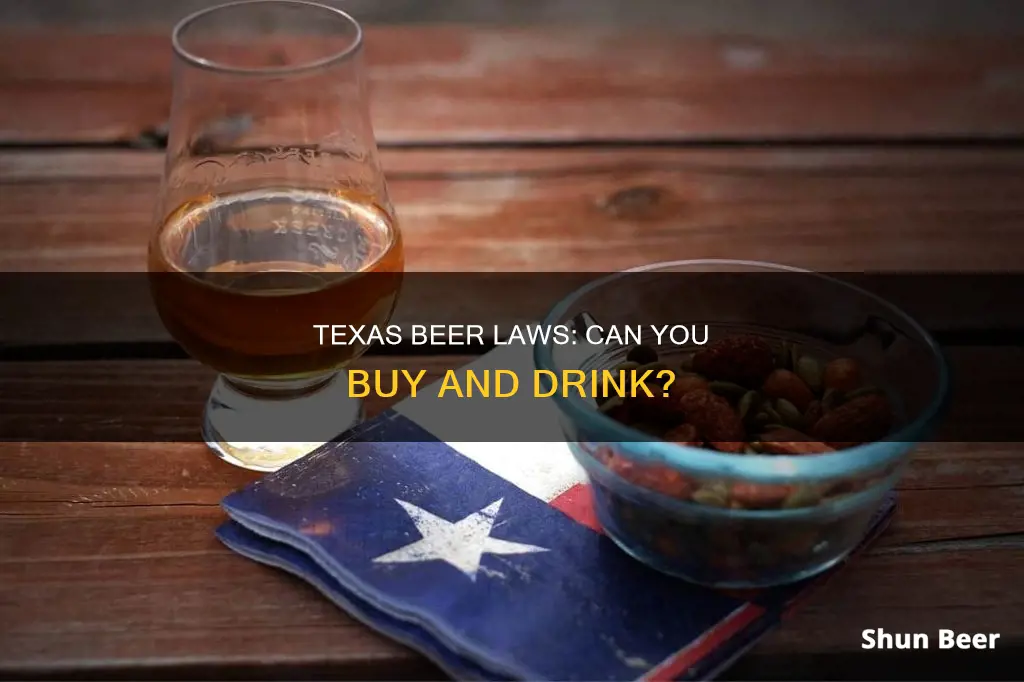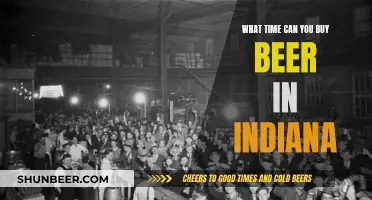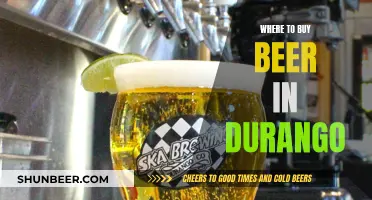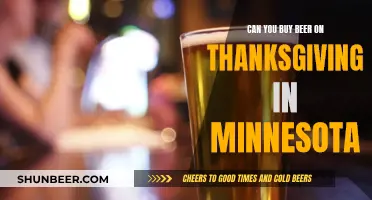
Texas has strict laws regulating the sale of alcohol, known as blue laws. These laws prohibit the sale of liquor on Sundays, Thanksgiving Day, Christmas Day, and New Year's Day, with additional restrictions on beer and wine sales. Beer and wine can be purchased from 7:00 am to midnight, Monday to Friday, from 7:00 am to 1:00 am on Saturday, and from 10:00 am to midnight on Sunday. These laws, originally designed to protect Sunday as a day of worship, have evolved over time, with some changes occurring in 1985. Texas's alcohol laws are a fascinating example of how historical practices can persist into modern times, reflecting the state's unique cultural and religious heritage.
| Characteristics | Values |
|---|---|
| Days beer can be bought in Texas | Monday to Saturday |
| Time beer can be bought in Texas on weekdays | 7:00 AM to midnight |
| Time beer can be bought in Texas on Saturdays | 7:00 AM to 1:00 AM |
| Time beer can be bought in Texas on Sundays | 10:00 AM to midnight |
| Days liquor can be bought in Texas | Monday to Saturday |
| Time liquor can be bought in Texas on weekdays | 10:00 AM to 9:00 PM |
| Time liquor can be bought in Texas on Saturdays | 10:00 AM to 9:00 PM |
| Time liquor can be bought in Texas on Sundays | Not allowed |
What You'll Learn

Beer and wine sales hours
On-Premise License or Permit (e.g. Bar or Restaurant)
Monday to Friday: 7 am-midnight
Saturday: 7 am-1 am (Sunday morning)
Sunday: Noon to midnight (10 am-noon only in conjunction with the service of food)
If the establishment is in a city or county that permits late hours and they have a late-hours permit, they can sell alcohol for on-premise consumption until 2 am any night of the week.
Off-Premise Beer/Wine License or Permit (e.g. Convenience Store or Grocery Store)
Monday to Friday: 7 am-midnight
Saturday: 7 am-1 am (Sunday morning)
Sunday: 10 am-midnight
A wine-only package store that holds a beer license may not sell wine containing more than 17% alcohol by volume on a Sunday or after 10 pm on any day. A wine-only package store that does not hold a beer license must follow the same hours as a package store.
Package Store/Liquor Store
Monday to Saturday: 10 am-9 pm
Closed on Sundays, Thanksgiving Day, Christmas Day, and New Year's Day. If Christmas Day or New Year's Day falls on a Sunday, the store must remain closed the following Monday.
Liquor cannot be sold or delivered on Sundays, before 10 am, or after 9 pm on any other day, or on New Year's, Thanksgiving, or Christmas Day.
Festivals, Fairs, or Concerts
Licensed or permitted premises located at festivals, fairs, or concerts may sell alcoholic beverages between 10 am and noon on Sundays, in addition to any other period during which alcohol sales are authorised.
Monday to Saturday: 8 am-midnight
Sunday: 10 am-midnight
Buying Beer in Mississippi: Sunday Shopping Laws
You may want to see also

Liquor sales hours
Texas has a unique set of liquor laws that can be challenging to navigate. The state's liquor laws are influenced by its religious and cultural heritage, resulting in a mix of conservative and liberal drinking rules.
Texas has specific regulations governing the sale of liquor, which are outlined in the Texas Alcoholic Beverage Code. These regulations vary depending on the type of alcoholic beverage and the day of the week. Here are the liquor sales hours for different days:
Monday to Friday:
Liquor stores in Texas are permitted to sell liquor from 10 am to 9 pm, Monday through Friday. This timeframe applies specifically to liquor sales in stores.
Saturday:
On Saturdays, the hours for liquor sales remain the same as weekdays, starting at 10 am and ending at 9 pm. However, some locations may have extended hours for beer and wine sales, allowing sales until 1 am on Sunday morning.
Sunday:
Texas has stricter regulations for liquor sales on Sundays. Liquor stores are prohibited from selling liquor on Sundays and must remain closed. Beer and wine, on the other hand, can be purchased from grocery and convenience stores from 10 am to midnight on Sundays. This extended timeframe from a previous noon start time offers greater flexibility for consumers.
It is important to note that Texas has additional restrictions on liquor sales during certain holidays. Liquor sales are prohibited on Thanksgiving Day, Christmas Day, and New Year's Day. If these holidays fall on a Sunday, the prohibition is carried over to the following Monday.
On-Premises Consumption:
The hours for on-premises consumption of alcoholic beverages in bars and restaurants may differ from the retail sales hours mentioned above. In Texas, bars and restaurants with a late-hours permit can serve alcoholic drinks until 2 am every night, provided they are located in cities or counties that allow such sales.
Additionally, there are specific exemptions for certain establishments. Hotel bars, for example, can serve alcohol to registered guests at all hours. Sporting events, festivals, and wineries are also exempt from the usual Sunday restrictions, allowing liquor consumption as early as 10 am.
Dry Counties:
Texas also has what are known as "dry counties," where the sale and consumption of alcoholic beverages are prohibited. However, most counties in Texas are considered "mixed counties," with a combination of wet and dry areas, resulting in varying alcohol laws within the same state.
Beer and Uniforms: What's the Legal Drinking Policy?
You may want to see also

Minors drinking in public
Texas has strict policies against underage drinking, and minors caught drinking in public face severe consequences. Texas law prohibits the consumption and possession of alcohol by minors, with limited exceptions. A minor may consume or possess alcohol in the visible presence of their adult parent, guardian, or spouse. This exception is valid at the minor's residence and in public.
If a minor is found drinking in public, they can be arrested for Public Intoxication if they appear intoxicated to the extent that they may endanger themselves or others. Public Intoxication is a severe Class C misdemeanour, punishable by a maximum fine of $500, community service, and a permanent criminal conviction. Police are known to aggressively enforce zero-tolerance alcohol laws for minors and will make arrests upon the slightest provocation.
Minors caught drinking in public can also be charged with Possession of Alcohol by a Minor (MIP) or Consumption of Alcohol by a Minor (MIC). These are both Class C misdemeanours, punishable by a maximum fine of $500, community service, Alcohol Awareness classes, and a permanent conviction and driver's license suspension in some cases. If a minor has two or more prior convictions, they face an enhanced punishment of a maximum $2,000 fine and up to six months in jail.
In addition to legal consequences, underage drinking can have a devastating impact on a minor's college and career prospects. A criminal record, even for a minor offence, can affect their ability to pursue educational and professional opportunities. As such, it is crucial for minors to be aware of the laws and the potential repercussions of drinking in public.
Buying Beer on Sundays in Washington State
You may want to see also

Dry, wet, and moist counties
In the United States, a "dry" county is one where the local government forbids the sale of any alcoholic beverages. Some prohibit off-premises sales, some prohibit on-premises sales, and some prohibit both. In contrast, "wet" counties allow and regulate alcohol sales, while "moist" counties permit some alcohol sales or are dry counties containing wet cities.
Texas is one of 33 states that allow localities to prohibit the sale of alcohol. Of its 254 counties, 4 are completely dry, 195 are partially dry, and 55 are entirely wet. The majority of entirely wet counties are in the southern border regions of Texas near Mexico, or in the south-central portion.
Dry Counties
- Borden County: A mostly rural region in the northwest of Texas, with a population of around 654. The county is characterised by dry plains, small towns, and farming. The people of Borden County consistently vote in favour of a ban on alcohol sales.
- Kent County: Also located in the northwest sector of the state, with a declining population since the 1930s. The county was once a centre of Texas agriculture but has since shifted to the oil industry. The small population continues to vote to keep the county dry.
- Roberts County: Located in the northern panhandle of Texas, with a population of about 850. The main commercial activity is cattle ranching, and the county is known for its strong Republican support.
- Hemphill County: Situated on the Texas-Oklahoma border, with a population of 3,800 in 2019. Historically, the county has been a hub for cattle ranches and the railroad industry. While the oil industry has brought new residents to the area, the county remains dry.
- Throckmorton County: Unlike the other dry counties, Throckmorton is located close to the major metropolitan areas of Dallas and Fort Worth. About half of the 1,600 residents work in agriculture, and the area is sparsely populated. The voters have consistently opted to keep the county dry.
Wet Counties
Texas has 55 entirely wet counties, mostly in the southern border regions and the south-central portion of the state. These counties allow the sale of alcohol, including beer, wine, and liquor, with some restrictions on days and hours of sale.
Moist Counties
Texas also has 195 partially dry counties, which allow certain types of alcohol sales. For example, some moist counties only permit the sale of beer and wine, while others restrict the sale of beverages to those with an alcohol content below a certain percentage.
Send Takeout and Beer Delivery: A Perfect Match?
You may want to see also

Alcohol storage and transportation
Texas has a comprehensive set of laws regulating the storage and transportation of alcoholic beverages. These laws apply to both individuals and businesses and cover a range of alcoholic drinks, including liquor, wine, and beer.
Transportation of Alcoholic Beverages
Texas law permits individuals to transport alcoholic beverages for their own consumption from a place where its sale is legal to a place where its possession is legal without needing a license or permit. However, there are specific rules for transporting larger quantities of alcohol or for commercial purposes.
For liquor transportation into or within Texas, a written statement from the shipper is required, detailing the consignor, consignee, origin, and destination of the shipment. This statement must be available for inspection by relevant authorities and serves as prima facie evidence of the legal right to transport the liquor.
The transportation of malt beverages, including beer, is generally allowed within the state, even if the route crosses a dry area. However, a written statement from the shipper is required, providing details such as the consignor, consignee, origin, destination, and other relevant information. This statement must be exhibited to any representative of the commission or peace officer upon demand.
It is important to note that there are restrictions on delivering liquor and malt beverages to dry areas, with specific provisions for common carriers and distributors.
Texas also allows for the importation of alcoholic beverages for personal use, with certain quantity limitations. For example, an individual can import up to 24 12-ounce bottles of malt beverages, 3 gallons of wine, and 1 gallon of distilled spirits for personal use without a permit. However, this is limited to once every 30 days, and the importer must pay state taxes and administrative fees.
Storage of Alcoholic Beverages
The storage of alcoholic beverages is primarily regulated through the licensing and permitting system administered by the Texas Alcoholic Beverage Commission (TABC). Different licenses and permits are required for different types of alcoholic beverages and the purposes of storage, such as for personal consumption, retail sale, or service in a bar or restaurant.
For example, a Brewer's License (BW) authorizes the holder to manufacture, import, transport, store, and sell malt beverages under certain conditions. A Winery Permit (G) allows the permit holder to transport, store, and sell wine, as well as conduct wine festivals. A Distiller's and Rectifier's Permit (D) authorizes the holder to manufacture, rectify, purify, refine, or mix distilled spirits and wines, as well as transport and store these products.
Additionally, there are specific licenses and permits for businesses such as package stores, restaurants, bars, and clubs, each with their own set of regulations regarding the storage and service of alcoholic beverages.
Using Walgreens Gift Cards to Purchase Beer Legally
You may want to see also
Frequently asked questions
Beer can be purchased from 7:00 AM to midnight Monday through Friday, from 7:00 AM to 1:00 AM on Saturday, and from 10:00 AM to midnight on Sunday.
Yes, beer can be purchased in Texas on Sundays from 10:00 AM to midnight.
No, alcohol sales are prohibited on these days.







